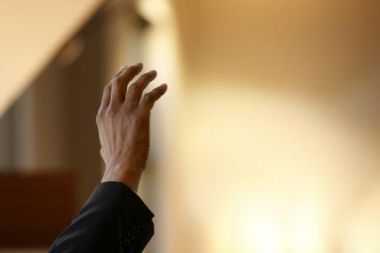The spiritual pilgrimage of Lent begins with closing our mouths

The Bishop of London had a word of encouragement at the start of Lent for Christians experiencing the desert in their journey of faith.
The Right Reverend Richard Chartres, preaching on Ash Wednesday, used the "vitriol" surrounding the debate in the Church of England over human sexuality as a springboard for calling Christians to a period of quiet self-reflection.
"There is a word for all of us in today's gospel - if there is any one among you who is without sin, let him cast the first stone," he said.
Reflecting on the moment when Jesus bends down to the ground and writes in the earth instead of speaking, the bishop said the spiritual pilgrimage of Lent "begins with closing our mouths" and reflecting on personal shortcomings instead of judging others.
"This is the sad springtime of the Christian year. This is a day for joy as we recognise that a life which is all carnival with no ensuing Lent simply makes us sick, when we are invited to realise that the harvest of our self-righteousness is self- destruction," he said.
"Much of the time we live on the surface in the midst of the strife of tongues. Our ego life, located in that surface self, is subject to a great clamour of competing thoughts and emotions.
"Fear of the future; remorse for the past; our place in the competition for glittering prizes; lust; anger; greed; all jostle against one another because most of us are not simple people with a longing for peace and a genuine desire to love and be loved."
He warned against the desert in the inner life and the temptation to be cynical, which he said could be "addictive".
"At the heart of Lent, the sad springtime of our Christian year, is a pilgrimage to the new life of Easter. We deny fuel to the surface existence where the clamorous ego is located," he said.
"We fast to be free from all those drives and cravings which keep us in prison, shackled to the treadmill of surface existence, and that frustrates our re-connection with the freshness deep down things. We long for the desert to bloom and for our lives to be filled with the love that is God."
He also warned that the "obtuseness of modern culture" could make it harder for people to engage with the Bible "intelligently" and understand the inner meaning of their desert.
The antidote to the desert, he reminded believers, was "sober examination" of spiritual impediments and reflection on the "self-giving" love of God that "has the power to transform life".
"We must soberly look at our own lives and note how far the desert has spread and the meaninglessness of so much that occupies our time. 'Killing time' is one of those phrases in ordinary language which convey deep wisdom," he said.
He encouraged Christians not to waste their time with things like "useless remorse" and judging others, but instead work on changing their own behaviour and foster a "deeper generosity".
Although he acknowledged the difficulty of balancing work and family life, he pressed people to make time for prayer.
"Just as we can find time to keep up with the news and even read a daily newspaper, it should be possible to make time for the prayer of longing expressed in silence. Such regular prayer is vital to our growth and refreshment," he said.











